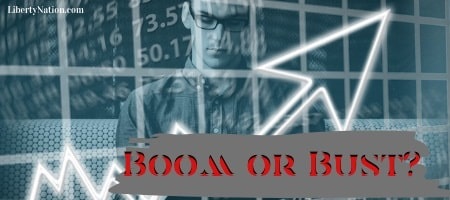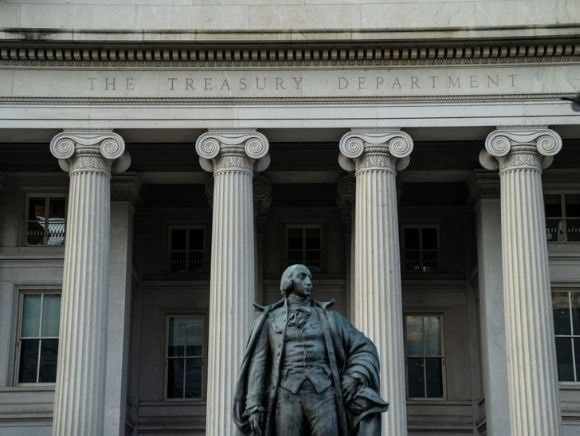Over the last 18 months, the Federal Reserve has injected nearly $5 trillion into Main Street and Wall Street by buying up Treasurys, scooping up corporate debt, and injecting liquidity into the economy. The U.S. central bank is now thinking about tapering its unprecedented quantitative easing (QE) program, signaling that it is confident the world’s largest economy can survive without training wheels in the post-pandemic recovery. But the United States has seen this before, particularly in the financial markets: When the Eccles Building forces the junkies in the Swamp and on the Street to go cold turkey without an easy fix, terrible trends form. Is a taper tantrum on the horizon, or will the institution get cold feet?
QE4ever, No More?
 In recent weeks, several Fed officials have come out in favor of shedding the organization’s $120-billion-a-month bond-buying endeavor. From St. Louis Fed Bank President James Bullard to Kansas City Fed Chief Esther George, a growing number of central bank heads are presenting the case to the public that now would be time to begin reducing support for the rebounding economy. Will Jerome Powell heed the advice of his colleagues?
In recent weeks, several Fed officials have come out in favor of shedding the organization’s $120-billion-a-month bond-buying endeavor. From St. Louis Fed Bank President James Bullard to Kansas City Fed Chief Esther George, a growing number of central bank heads are presenting the case to the public that now would be time to begin reducing support for the rebounding economy. Will Jerome Powell heed the advice of his colleagues?
According to The Wall Street Journal, the Fed could conclude these asset purchases – $80 billion in Treasury securities and $40 billion in mortgage-backed securities (MBS) – by the middle of next year. Market analysts could gain more insight from these growing expectations when the Fed releases the minutes from the July 27-28 Federal Open Market Committee (FOMC) policy meeting.
Sources are telling the newspaper that unwinding these purchases sooner than initially anticipated would give the body some flexibility to raise interest rates, particularly if inflation remains hot and the unemployment rate plummets. Powell has stated before that he would not pull the trigger on a rate hike until the coronavirus public health crisis is far in the rear-view mirror. However, with Delta and Lambda variant concerns plaguing consumer sentiment, the Fed may choose to play the waiting game on rates.
A recent CNBC Fed Survey had respondents penciling in January as the start of the taper, while a separate Reuters poll had economists picking September as the month when the central bank would ease monetary efforts. But while markets could be a tad cavalier on betting on tapering, some FOMC members want to be a bit more conservative and wait a few more months of employment data, economic numbers, and school openings before normalization.
Should the Fed decide to remove the spiked punch bowl from The Street, what would this mean in a broader context of an economy and financial market that had been so reliant on monetary support?
Fed Feeding Funds
 The consensus among the smartest men and women on CNBC and Bloomberg is that the Fed would give enough notice to institutional investors, armchair traders, and the hedge funds about potential tightening. In other words, the FOMC would announce in September that it would cut its monthly bond acquisitions beginning a few months later. The idea is that it would proffer ample time for markets to get accustomed to fewer handouts. However, it is unclear if this would be an elementary case of drawing up plans to trade in the equities arena without an automatic and costly bailout scheme known as money-printing.
The consensus among the smartest men and women on CNBC and Bloomberg is that the Fed would give enough notice to institutional investors, armchair traders, and the hedge funds about potential tightening. In other words, the FOMC would announce in September that it would cut its monthly bond acquisitions beginning a few months later. The idea is that it would proffer ample time for markets to get accustomed to fewer handouts. However, it is unclear if this would be an elementary case of drawing up plans to trade in the equities arena without an automatic and costly bailout scheme known as money-printing.
For years, investors have hung onto every word emanating from the lips of FOMC members. They depend on the printing presses to keep the mirage of prosperity going. Any time there had been previous discussions of rate hikes or curbing QE, the leading benchmark indices would slump. This happened this past spring when Treasury Secretary Janet Yellen even alluded to rate hikes at the Fed. There is a reason why the Dow Jones Industrial Average, the S&P 500, and the Nasdaq Composite Index soared to all-time highs despite the United States enduring a once-in-a-century global health crisis, record unemployment, and remarkable economic destruction.
Here is a brief list of indicators suggesting that the road to 11 Wall Street is not paved with gold:
- Margin debt (borrowing money to buy stocks) is at a record high of $822 billion.
- The Buffett Indicator (stock market capitalization-to-GDP ratio) is at an all-time high.
- Corporate earnings need to increase 3.8% forever for stock prices to make sense.
- S. investor sentiment is off from its peak of 57% in April, falling below 37% in July.
Profiting Off Moral Hazard
In the end, U.S. financial markets need the Fed to keep elevating its record-setting balance sheet, leave interest rates near zero, and inject the markets with liquidity. Without the Fed taking on bonds, corporate debt, and mortgage securities and feeding junkies from the spigot, financial institutions and the federal government would be unable to sustain the illusion of affluence and the market trending higher in perpetuity. Likewise, politicians and professional traders need the Fed to act as a crutch, an enabler, and a dealer. Otherwise, both parties would need to turn to authentic, not toxic, wealth creation – and this requires the antiquated ideas of genuine work and sacrifice.
~
Read more from Andrew Moran.




